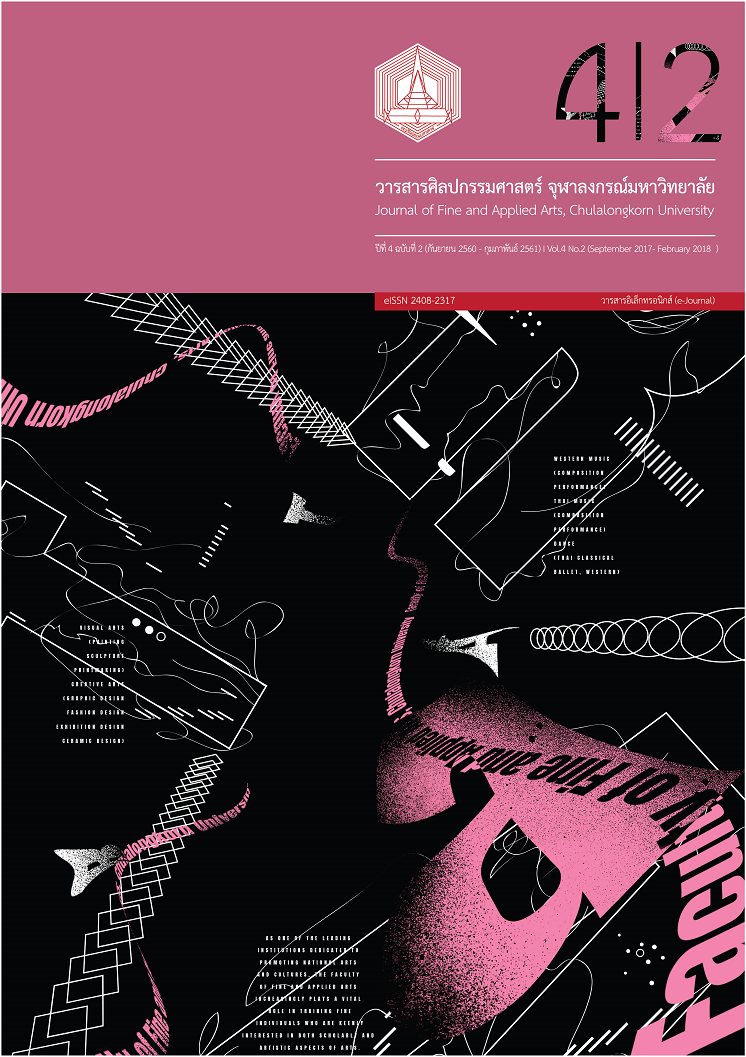วัฒนธรรมนาฏยศิลป์ไทยในฐานะหน่วยทางเศรษฐศาสตร์จุลภาค : การสำรวจข้อมูลประวัติศาสตร์เชิงวัฒนธรรม
Keywords:
การละครศึกษา, นาฏยศิลป์ไทย, ประวัติศาสตร์เชิงวัฒนธรรม, Theatre Studies, Thai Dance, Cultural HistoryAbstract
การศึกษาครั้งนี้อาศัยกระบวนการเก็บข้อมูลเชิงคุณภาพ เพื่อสำรวจปรากฏการณ์ของนาฏยศิลป์
ในวัฒนธรรมไทย โดยมีสมมติฐานว่านาฏยศิลป์ครองพื้นที่ในวิถีชีวิตของคนไทยอยู่ในสามลักษณะ ได้แก่ นาฏยศิลป์ในฐานะการบันเทิง นาฏยศิลป์ในฐานะพิธีกรรม และนาฏยศิลป์ในฐานะหน่วยทางเศรษฐศาสตร์จุลภาค อันเป็นส่วนหนึ่งของวิถีชีวิตของมนุษย์ซึ่งรวมเอาระบบเศรษฐกิจเอาไว้ด้วย การศึกษาพบว่า นาฏยศิลป์นั้นมีมูลค่าทางเศรษฐกิจมาแต่เดิม ดังจะเห็นได้จากหลักฐานมาตั้งแต่สมัยกรุงศรีอยุธยา การเก็บภาษีที่งอกงามขึ้นมากตั้งแต่รัชกาลที่ 4 และอากรมหรสพในรัชกาลที่ 5 จนถึงรัชกาลที่ 6 นอกจากการประกอบอาชีพนาฏยศิลป์โดยตรงแล้ว ยังพบว่ามีการประกอบอาชีพสืบเนื่องด้วย เช่น การทำหัวโขน ซึ่งเป็นวิจิตรศิลป์อย่างหนึ่ง
การสำรวจข้อมูลพบว่านาฏยศิลป์มีมูลค่าในเศรษฐสังคมมาแต่โบราณ ข้อมูลปรากฏชัดขึ้นหลังจากประกาศในรัชกาลที่ 4 ว่าด้วยละครผู้หญิง ซึ่งนาฏยศิลป์ที่นัยว่ามีแนวโน้มเป็นที่นิยมของประชาชนอยู่แล้วได้แพร่หลายมากขึ้น มีการกำหนดอัตราภาษีทำให้รัฐมีรายได้เพิ่มขึ้น นอกจากนี้นาฏยศิลป์เองก็เป็นเครื่องช่วยให้กิจการอื่น ๆ เช่น บ่อน การจัดเก็บภาษีมหรสพมีรายได้ดีขึ้นเรื่อย ๆ จนกระทั่งเลิกจัดเก็บไป ด้วยเหตุผลทางการบริหารบ้านเมือง แม้ในปัจจุบัน อุปสงค์ทางด้านการแสดงก็ยังมีอยู่ คณะนาฏยศิลป์มีการปรับตัวให้ตอบรับความต้องการของสังคมได้อย่างดี
This study deploys qualitative data collecting methods in surveying cultural historic phenomena of dance in Thai culture with the hypothesis that dance occupies life of Thai people in three cultural areas i.e. dance as a form of entertainment, dance as a form of ritual, and dance as a microeconomic unit. The survey has found that dance has had economic value since ancient time, Economic life of dance troupe in Ayutthaya kingdom and flourishing taxation in King Rama IV to King Rama VI were documented. Not only the dance itself, but also supporting business factors such as prop makers and craftsmanship of costumes still play an important role in dance economy.
The Survey has also found more succeed in entertainment taxation after King Rama IV’s royal edict in 1854 by which restriction of female dance troupe was waived. The royal edict, more or less, answered social demand of entertainment as it was recorded that new form of entertainment taxation was issued. The royal government seemed to be more and more successful in reign of King Rama V since income from the taxation was eight times in value more of when it was started. Many of dance troupes in present time still survive by their adaptability since they not only do performance but also involve in ritual and dance ritual as requested.
Downloads
Published
Issue
Section
License
ลิขสิทธิ์ของบทความเป็นของเจ้าของบทความ บทความที่ได้รับการตีพิมพ์ถือเป็นทัศนะของผู้เขียน
กองบรรณาธิการไม่จำเป็นต้องเห็นด้วยและไม่รับผิดชอบต่อบทความนั้น






